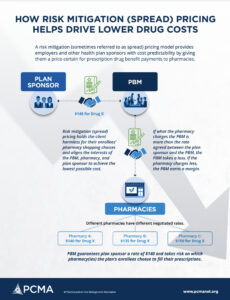Pharmacy Benefit Companies Provide Employers with Coverage Choices and Flexibilities t
hat Work for their Unique Needs
Pharmacy benefit companies offer employers, including small and mid-sized businesses, a variety of coverage options that allow business owners the flexibility to choose a plan design that will provide affordable, quality prescription drug coverage to their employees.
A risk mitigation pricing model, also sometimes referred to as spread pricing, provides employers and other health plan sponsors with predictability on the cost of their prescription drug benefit. Every employer has different goals and needs: some prefer predictability, some value cash flow, while others prioritize visibility into discounts negotiated on their behalf.
For many small and mid-sized businesses, that means having the option to choose spread pricing and the predictability of fixed pricing for drugs dispensed by pharmacies is what works best for them and their employees.

For the one-third of employers who select spread pricing as an option, they are looking for more predictable, fixed pricing for drugs dispensed by pharmacies — without administrative fees.
As U.S. Senator Rand Paul (R-KY) said during a recent U.S. Senate Health, Education, Labor and Pensions (HELP) Committee markup of misguided legislation targeting this option:
“This bill bans spread pricing, which small businesses and startups often choose because the PBMs take on the additional risk for themselves…This bill takes away choices. So there is a choice in the marketplace between spread pricing and pass through, every company has it. You’re going to take this choice away… Some labor unions actually like this choice… Some small businesses do. In fact, the PBMs compete on this model. The smaller PBMs absorb more risk and offer a cheaper product… Small businesses choose it on price and the smaller PBMs do it to try to take away market share from the bigger PBMs.”
Echoing similar concerns, Senator Mitt Romney (R-UT) said:
“A vast majority of small and middle-sized employers prefer spread price contracting because it’s lower cost and more certainty for them. That’s why they choose it. Making that illegal is not going to help small or mid-sized businesses. Our understanding as well is that the majority of unions also prefer spread price contracting.”
In a letter to the Senate HELP Committee, the U.S. Chamber of Commerce also warned that eliminating risk-mitigation pricing, or spread pricing, would make it more difficult for employers to offer pharmacy benefit coverage to their employees saying:
“Risk-mitigation pricing (also referred to as spread-pricing) provides employers a definitive price for prescription drug benefit payments to pharmacies, and transfers the risks associated with daily fluctuations in drug prices onto the Pharmacy Benefit Manager (PBM). This ability to include spread pricing as part of a contractual agreement is highly valued by many employers and plan sponsors and incentivizes these PBMs to push pharmacies to reduce their acquisition costs. This is a contracting term that employers demand, bringing much needed pricing predictability. The Chamber opposes proposals that would eliminate and prohibit the ability of entities to include such a provision in private contracts.”
Lawmakers should oppose legislation that eliminates options for employers, especially small and mid-sized businesses, that help them provide affordable, quality prescription drug coverage to their employers. Instead, lawmakers should focus on encouraging competition – the most effective way to lower prescription prices for patients and families.
###
Learn more about public policy solutions that would promote competition in the prescription drug market and effectively lower prices for patients HERE.
Learn more about the critical role of pharmacy benefit companies and how Big Pharma’s egregious practices are the root cause of high drug prices HERE.

